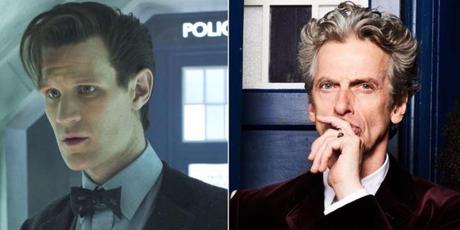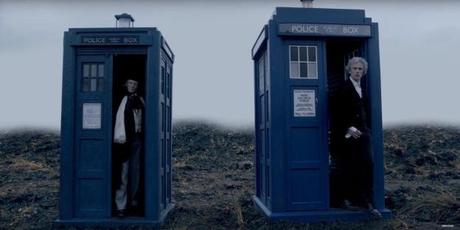So, the Peter Capaldi era is officially over. "Twice Upon a Time," which premiered on BBC and BBC America Christmas night and streamed into select theaters in North America last night, saw the elderly Doctor regenerate into Jodie Whittaker, who got all of two words ("Oh, brilliant") before she was tossed straight out of an exploding Tardis and dropped to Earth. The reviews for the episode have been mixed-to-positive:


And Whittaker's Matt Smith-esque introduction - alone and displaying instant exuberance despite being tossed around like a ragdoll in a Tardis undergoing an extreme makeover - seems to have been well received. "I mean if I was Jodie Whittaker and I looked at myself in a mirror for the first time those would be my first words too," wrote one on Twitter. Those who argued Whittaker's casting would kill the show's ratings will have to wait a little longer to see if they're right since "Twice Upon a Time" managed to at least top last year's Christmas special in live UK viewership.
However, before we move on to the next Doctor and her new showrunner, Broadchurch's Chris Chibnall, let's stop to appreciate the Capaldi era as well as Steven Moffat's run. Under Moffat's watch, the show reached new heights, both creatively and in worldwide popularity. Karen Gillan, for example, has now starred in two different blockbuster movies this year - Guardians of the Galaxy 2, Jumanji: Welcome to the Jungle - and it's all because of Doctor Who. Matt Smith and Jenna Coleman have moved on to award-winning period dramas, The Crown for the former, Victoria for the latter, and Arthur Darvill is three seasons into Legends of Tomorrow, the goofiest, but most purely enjoyable comic book show on TV right now.
Actors from the pre-Moffat era have also found similar success after the show, e.g., Billie Piper in Secret Diary of a Call Girl, David Tennant in Broadchurch and Jessica Jones, Christopher Eccleston in The Leftovers, John Barrowman in, um, everything. However, no one has crossed over into film quite like Gillan, and that's largely a testament to how her performance as Amy Pond both connected with audiences and put her on the map of Hollywood casting directors and geek-leaning directors like James Gunn. Capaldi's final Christmas special aired in the same theaters currently playing Jumanji to surprisingly packed crowds, laughing along as Gillan (and Jack Black) manage to kind of steal the movie from The Rock.

It's almost hard to believe it's now been five years since Gillan and Darvill left the show and four since Smith followed them. In the time since then, Doctor Who has lost a fair deal of its cultural cache, shedding several million average viewers (e.g., the audience for Smith's final episode was double the size of Capaldi's swan song) as audiences struggled to adjust to Capaldi's decidedly un-Smith like Doctor and/or grew tired of Moffat pulling from the same old bag of storytelling tricks. In truth, his once tantalizing mystery box narratives and epic escalation of scale and mythical worldbuilding wears on you after a while. So, for some bidding adieu to Capaldi and Moffat is less goodbye and more good riddance. Bring on Jodie Whittaker and Chris Chibnall as fast as you can, please. However, I will miss Capaldi and Moffat.
The Smith era gave audiences an easily imitated, childlike Doctor and companions who were still on the cusp of becoming adults, their roles in the story initially being framed in more fairytale-like terms. It's easy, then, to see how that resonated with younger audiences just as it is to see why the Capaldi era turned some of them away. In Smith's place we got a more mysterious, grandfatherly figure with attack eyebrows and enhanced capacity for gloom and doom, and Coleman's Clara, always awkwardly paired with Smith, morphed from a girl with a crush to a woman stuck in a codependent relationship so destructive it cost her the love of her life, which turned her so reckless she stormed right into her own death a season later. The somewhat more innocent fun of years past gave way to deeper explorations of grief, particularly the level of denial the Doctor and Clara would indulge or the extent to which they would go to save those they loved. It was the type of storytelling which was deeply rewarding for those who gave themselves over to it but off-putting for those whose idea of Doctor Who differed from what they saw before them (e.g., Clara, not the Doctor, is basically the main character of season 8).
The most recent season, Capaldi's third overall, played like a giant course-correction. Real life budget cuts forced a reduction in scale, which was maybe a bit of a gift since the Capaldi-Coleman run had escalated the stakes to an insane level, e.g, the Doctor spent a millennia stuck in a Time Lord trap just to save Clara. So, the Doctor got a new bright-eyed companion (Pearl Mackie's instantly lovable Bill) and a mystery box puzzle anchoring him to Earth, thus giving us the relatively new sight of the Doctor actually holding down a job (as a suitably quirky college professor) and having an office of his own outside the Tardis. Michelle Gomez's revelatory turn as Missy came to an end after undergoing a rather satisfying redemptive arc, and a hit-and-miss season culminated in one of the finer Cybermen stories of the modern era. Missy went out in a multi-Master episode, setting Capaldi's Doctor to go out in a multi-Doctor episode.

Which finally brings us to "Twice Upon a Time."
The most recent Doctor and the first one (David Bradley subbing in for William Hartnell) teamed up together to return a displaced WWI soldier (played by long time Moffat collaborator and frequent Who guest star Mark Gatiss) back to the timeline and...
That's it. Doctor Who Christmas specials often play bigger and broader than a normal episode, but "Twice Upon a Time" surprised with how reserved it was. The antagonists - crystal-like beings from the future - turned out to be benign historical observers. The Doctor had a civil conversation with a Dalek. The inevitable conflict between Doctors was mostly used to poke fun at the show's misogynist roots, the original Doctor's casual sexism being admonished by the most recent one thus setting the stage for the first (canonical) female Doctor to be ushered into existence. Moffat returned to the glorious theme of his very first Doctor Who story, which is that just once everyone actually lives (well, kind of - the WWI Christmas truce of 1914 still resulted in those soldiers killing each other after the armistice), and Capaldi got to say goodbye to his companions, including Clara.
I had some quibbles with the special. I've seen enough of the Hartnell era to know he wasn't quite the cartoon he's made out to be here. Clara's return felt tacked on and overly green screeny, shoved in-between the Doctor's goodbyes with his most recent companions Bill and Nardole. Amy's cameo to send Smith's Doctor off was far more seamless.
However, for the most part, I loved "Twice Upon a Time." It was a graceful final note for a beleaguered, but sneakily rewarding era for the show.
It's one of those geek "what if?" questions to look back at Moffat's decision to cast Capaldi and wonder what might have been had he cast a person of color or woman or at least someone younger at that point since those are the kinds of choices everyone was arguing for. Would the show's popularity still have crested with the 50th anniversary special, or could that momentum have been if not absolutely then at least somewhat maintained with a more popular choice? However, I look back on the past four years of Doctor Who and see some of the show's best all-time episodes - "Listen," ""Mummy on the Orient Express," "Flatline," "Face the Raven," "Heaven Sent," "Hell Bent," all of which I struggle to imagine anyone other than Capaldi playing. I also see a show which had to deal with its past - the return of the Time Lords, the redemption of The Master - before it could head into the future. I am ready to see what Whittaker and Chibnall have to offer, but I am grateful for everything Capaldi and Moffat gave us.
Well, maybe not that space dust episode in season 9. That was just bad.
But Doctor Who always swings big. Now, for the first time in a decade, it'll be someone other than Moffat stepping up to that plate. May their worst episodes be no worse than Moffat's and best episodes even better. May they live up to Whittaker's first line. Please, Doctor Who, be brilliant. But it's not like you have to start being brilliant. You've done a pretty good job of it for the past four years.
What did you think of "Twice Upon a Time"? And how do you feel about the end of Moffat and/or Capaldi's time with the show? Let me know in the comments.

